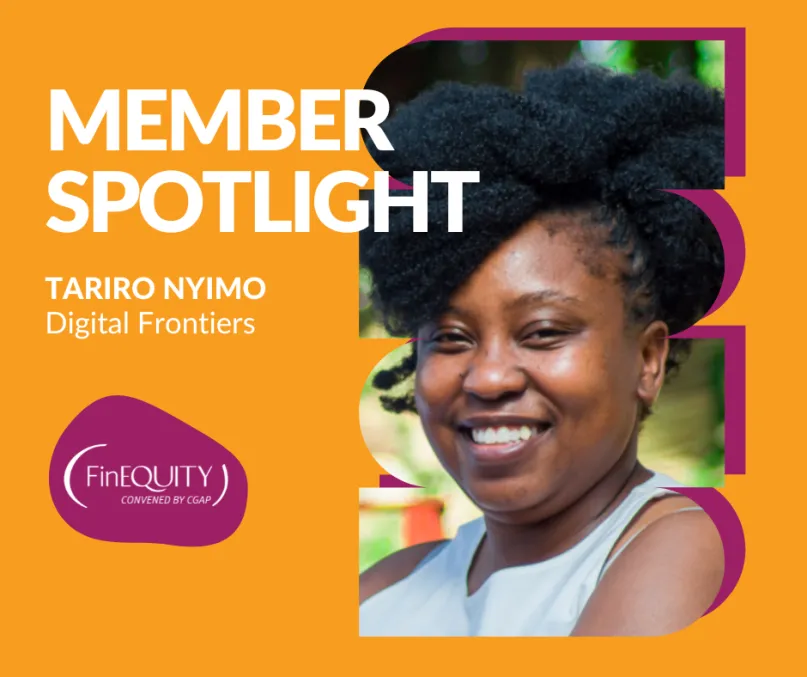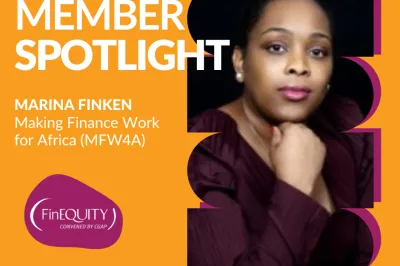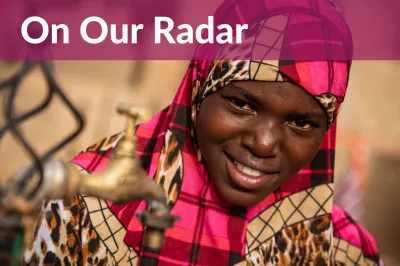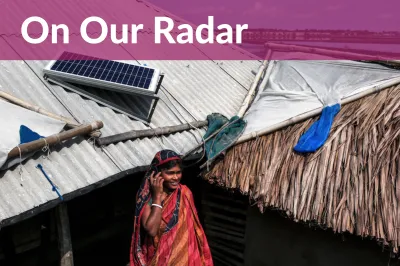Member Spotlight: Tariro Nyimo

Tariro Nyimo, Deputy Divisional Director at the Digital Frontiers Institute, sat down with us to discuss DFI's capacity-building programs, reaching the SDGs by 2030, priorities for Digital Frontiers’ work in 2022 and more.
FinEquity: Tell us a little bit about yourself. A fun fact? Something that might surprise most people? Your superpower?
Tariro: I am definitely Elastigirl from The Incredibles! I can stretch anything: my vision, my dreams, my budget, just when you think I have reached my breaking point, I stretch some more. If I did not follow an Inclusive Finance career, I would have been some kind of writer in the Creative Arts. I enjoy being with people who see other people.
I am Deputy Divisional Director at Digital Frontiers, specifically with the Digital Frontiers Institute. I am also the Certified Digital Finance Practitioner (CDFP) Programme Lead.
FinEquity: How did you get involved in the women’s financial inclusion space?
Tariro: I was introduced to the concept of Financial Inclusion as a Bank Examiner at the Reserve Bank of Zimbabwe and later went on to participate in low-cost banking projects and solutions for the unbanked populations across sub-Saharan Africa working for a Fintech in Johannesburg, South Africa. Feeling dissatisfied by the solutions we were implementing, I signed up for the Mphil in Inclusive Innovation at the Graduate School of Business (University of Cape Town). With a promise to engage in an impactful research project and to develop innovative responses to complex social issues, I found myself being drawn to Women’s Financial Inclusion focusing on smallholder farmers.

I spent some time in the field in Honde Valley Zimbabwe, investigating whether the available financial products were meeting the needs of women smallholders. I then joined Digital Frontiers and embarked on the Certified Digital Finance Practitioner (CDFP) journey. The choices I made along my journey to certification solidified me as a Women’s Financial Inclusion enthusiast.
FinEquity: You’ve been the Deputy Divisional Director at Digital Frontiers for almost a year, can you tell us a bit about what that experience has been like so far? What are you working on that makes you excited?
Tariro: Digital Frontiers (DF) is a not-for-profit capacity building specialist headquartered in South Africa and focused on building human capacity aligned with achieving the U.N. Sustainable Development Goals. To date we have built and implemented comprehensive capacity building programmes that support the acceleration of global initiatives in digital financial services and financial inclusion, and gender equality. Our funders both past and present include The Bill & Melinda Gates Foundation, Omidyar Networks (Flourish Ventures), FSD Africa and MasterCard Foundation.
DF incorporates Digital Frontiers Institute (DFI), our school which delivers exceptional learning experiences and opportunities for continued professional development. Whilst DF was established as a not-for-profit organisation, we have managed to build an effective business model which ensures we are able to prioritise purpose over revenue, but still be an organisation who contributes from a financial perspective to the long-term sustainability of our business. Our training activities consist of the creation, maintenance and delivery of blended, but primarily online courses, through a built-for-purpose digital campus. To date we have trained over 9 000 professionals from 162 countries.
When I was promoted, I told myself not to waste the opportunity doubting my capabilities, to focus, be authentic, and find a way to align Digital Frontiers objectives to my own personal objectives. I must say the job has taken over my life! I am excited about growth, new markets, deepening into priority countries e.g. FSDA scholarships to Ethiopia, BMGF scholarships to Asia, new programmes and innovation in existing programmes. More and more CDFP graduates are gaining recognition and are having a voice in their markets. We are excited about more impact stories that trace how far they have come and how they are influencing Inclusive Finance and reducing gender gaps in Financial Inclusion.
When I was promoted, I told myself not to waste the opportunity doubting my capabilities, to focus, be authentic, and find a way to align Digital Frontiers objectives to my own personal objectives.
FinEquity: As a long-time SDG advocate and women’s financial inclusion champion, where do you think our sector be focusing in order to achieve these goals by 2030?
Tariro: What a question! I think that in our market, the work we do investigates ways to reduce poverty for women. Creating more inclusive financial ecosystems, especially in low-to-middle income countries (LMICs), is the tool that we choose to use as a pathway towards women’s economic empowerment. As the world becomes more connected, designing products that are customer-centric, improving digital literacy and consumer protection are key drivers for women’s financial inclusion. Our focus should be researching.
Women have different life stages, different needs at each stage and different contexts. Social norms weigh heavily in some countries, leaving some women behind in education, employment and income. The 980 million unbanked women globally are still less likely than men to own a mobile phone and across LMICs less likely to own a mobile money account. I think that the focus areas should include:
- Growth in mobile money services and strategies to increase women users in LMICs. Women require access to a phone, affordable internet, an account and widely available CICO agents in order not to be left behind in a highly digitized society;
- Finance MSMEs, (focus on women-led MSMEs). The World Bank estimates that more than 70% of workers in emerging markets earn their living in the informal sector;
- Accurate sex-disaggregated data, that supports the above to lift women out of poverty.
FinEquity: What are your top priorities in 2022 for your work?
Tariro: I am excited about Digital Frontiers’ new programmes in Inclusive Digital Economies, Gender Equality Change-makers, Digital Health payments and a new business model for the Certified Digital Finance Practitioner programme.

FinEquity: Do you have a success story from your work with Digital Frontiers you’d like to share? (An occasion where you felt that you or your organization was making a real impact in the lives of women?)
Tariro: Digital Frontiers has showed commitment to gender equality and equal opportunities for women in a number of ways:
- As an organisation, our board, leadership team and employee base are majority female (over 55%) and we have developed a Gender Blindspots course that focuses on ensuring we apply a gender lens to everything we do from our internal policies and procedures to how we develop and deliver our courses.
- Our student base is 35% female, we continuously strive to close this gap through the provision of female-focused scholarship programmes and have awarded thousands of scholarships to female applicants.
- I led the team that designed and fundraised for the Gender Equality Change-maker programme which was built and launched in 2021. We worked with the Global Centre for Gender Equality at Stanford University and The Centre of Sexualities AIDS and Gender (CSA&G) to design a programme that seeks to build a League of Gender Equality Changemakers equipped with everything they require to lead profound and lasting change in their organisations. You can learn more about the programme here.
- We continue to move the conversation forward on women’s inclusion through our webinars, podcasts and blog posts. You can engage with this content here.
FinEquity: What can our members connect with you about/what can they ask you about?
Tariro: Data on women’s financial inclusion, designing products and services, digitizing agricultural value chains and building agent networks.
FinEquity: What role does FinEquity play in your work? Where do you see value in this community? How has being a member shaped your work?
Tariro: FinEquity Community of Practice is where new projects and partnerships are born through networking. There are many different experts who widely share their knowledge, experiences and resources to advance the Women’s Financial Inclusion agenda.



Awesome! Very well articulated & insightful. Women participation & inclusion paramount for successful achievement of most if not all SDGs
Leave a comment